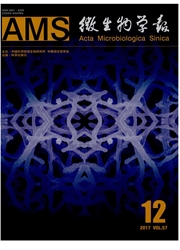

 中文摘要:
中文摘要:
【目的】分离高效降解木糖的嗜热厌氧杆菌菌株,用于发酵生产生物燃料乙醇,为后继的构建基因工程菌株及联合生物工艺提供材料。【方法】运用亨盖特厌氧操作技术从胜利油田油层采出液两年的富集样中分离到一株嗜热厌氧杆菌xyl-d。采用形态学观察、生理生化指标鉴定及基于16S rRNA的系统发育学分析确定其分类地位。【结果】菌株xyl-d为革兰氏阴性厌氧杆菌,菌体大小为(1.35-5.08)μm×(0.27-0.40)μm,单生、成对或成簇生长,芽胞圆形,端生。温度生长范围30-85℃(最适温度65℃);pH范围3.0-10.0(最适pH 7.5);NaCl浓度范围0%-4%(最适NaCl浓度2.0%)。发酵D-木糖的产物是乙醇、乙酸、CO2及少量的异丁醇、丙酸。菌株xyl-d的(G+C)mol%含量为45.6%,与热厌氧杆菌属模式菌株威吉利热厌氧杆菌(Thermoanaerobacter wiegelii)DSM10319T及嗜热乙醇杆菌(Thermoanaerobacter ethanolicus)DSM2246T的16S rRNA序列相似性均为99.3%。菌株利用D-木糖产乙醇的最佳初始pH为8.5;少量酵母粉能刺激生长并显著提高发酵D-木糖的产醇率,使乙醇成为主要的发酵产物;培养基中乙醇浓度达到7%(V/V)时菌体生长受到抑制,最佳生长条件下D-木糖的降解率可达91.37%,最佳产醇条件下发酵1摩尔D-木糖可产生1.29摩尔的乙醇。【结论】菌株xyl-d是从特殊生境(油藏)中分离到的一株高效降解D-木糖的耐酸、嗜热的厌氧杆菌,其为半纤维素降解产乙醇的联合生物工艺提供了菌源。
 英文摘要:
英文摘要:
[Objective] We screened a thermophilic xylolytic bacterium that produced fuel ethanol from a high-temperature oil reservoir,and provided microbial resources to genetic engineering strains construction and consolidated bioprocessing.[Methods] We adopted Hungate anaerobic technique to isolate strain xyl-d from oil reservoir water sample enriched for two years from Shengli Oilfield in China,and we identified strain xyl-d with morphological,physiological,biochemical and phylogenetic analysis.[Results] Strain xyl-d was gram-negative,rod-shaped,spore-forming and strictly anaerobic.The growth temperature ranged from 30 ℃ to 85 ℃(optimum 65 ℃) and the pH ranged from 3.0 to 10.0(optimum 7.5) and salt concentration was 0%-4%(optimum at 2.0%).It converted D-xylose into ethanol,acetate,CO2,trace amount of iso-butanol and propionate.The genomic DNA G+C contents of strain xyl-d was 45.6 mol%.Based on 16S rRNA gene sequence,strain xyl-d was most close to Thermoanaerobacter wiegelii DSM10319T and Thermoanaerobacter ethanolicus DSM 2246T both with the 99.3% similarity.It produced more ethanol and less acetate at initial pH 8.5 than other pH.Ethanol yield was increased significantly with yeast extract,and ethanol became the main end product.In addition,growth of strain xyl-d was inhibited obviously with ethanol concentration more than 7%(V/V).In the optimum growth conditions,xylose degradation rates reached to 91.37%.[Conclusion] Strain xyl-d was thermophilic,high xylose conversion rate,acidotolerant anaerobe.It was a potential bacterium that can be used for consolidated bioprocessing.
 同期刊论文项目
同期刊论文项目
 同项目期刊论文
同项目期刊论文
 期刊信息
期刊信息
